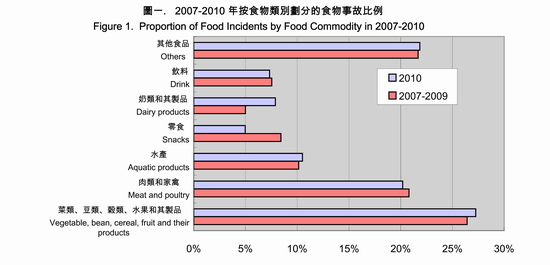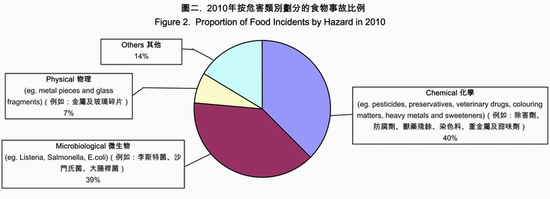
Food Safety Focus (55th Issue, February 2011) – Incident in Focus
Review of Food Incidents in 2010
Reported by Dr. Bo-yee SHU, Medical & Health Officer
Risk Assessment Section, Centre for Food Safety
Food supply in Hong Kong relies almost solely on imported food. The Centre for Food Safety (CFS) identifies overseas and local food incidents through its Food Incidents Surveillance System (FIS), as well as notifications from overseas food authorities, risk based food surveillance results and investigations of food complaints. The aim is to prevent and control any significant food safety problems.
General Trend of Food Incidents in 2010
In 2010, around 720 food incidents were identified by the CFS. This figure was comparable to those identified annually from 2007 to 2009.
The majority of the food incidents identified were of non-local origin (around 97.5%). Taiwan, United States and European countries accounted for most of them (66%); followed by the Mainland, Canada and Australia/New Zealand. Local cases accounted for only 2.5%.
Similar to the past three years, the most common food groups involved were vegetables, beans, cereals, fruits and their products which accounted for 27% of the incidents (Figure 1). For category of food hazard, chemical (40%) and microbiological (39%) hazards were equally common (Figure 2). No obvious change was noted in the past four years.
Actions Taken by CFS
After detection of food incidents, CFS will assess the ir public health significance and decide the most appropriate follow up actions. The factors that will be taken into consideration include the risk to target consumers, local regulations, information from related food authorities and local availability of the concerned product.
When affected products are available locally, CFS may request the trade to stop sale, issue warning letters, conduct further testing, and issue rapid alert to advise traders the appropriate actions that they should take. If indicated, public announcement may be made to recall products and to advise the public not to consume them. In 2010, CFS issued about 370 trade alerts and more than 10 press releases related to these incidents.
Highlights of Important Food Incidents in 2010
In 2010, a number of food incidents were detected which required more sophisticated investigations. Some of them are highlighted below.
Food Incidents with Products not Locally Available
In January 2010, there were media and official reports that a number of melamine contaminated milk products were found in several provinces in the Mainland. It was suspected that some melamine tainted milk products that had not been destroyed in 2008 were re-used for producing milk products. After detection of this incident, the CFS immediately contacted the Mainland authorities, and investigations did not reveal any sale of the affected products in the Hong Kong market. Trade alert of this incident was issued.
In February / March 2010, there was a series of media reports in various provinces in the Mainland concerning cowpeas, hairy melons, chilli pepper and snap bean from Hainan that were found to contain pesticide isocarbophos. The CFS immediately checked the import records and contacted Hainan Entry-Exit Inspection and Quarantine Bureau. It was found that the last consignment of vegetables from the province was in April 2009. As regards the affected products, they were grown in a farm not registered to export to Hong Kong. The CFS collected samples at import and retail levels for pesticide residue tests. All samples were satisfactory.
Food Incidents with Products Locally Available
In 2010, there were food incidents involving Salmonella or Listeria contaminated ready-to-eat food with products found available in Hong Kong. They were:-
- From January to March, CFS detected three large scale incidents involving a total of more than 400 Salmonella contaminated sausages, granola bars and potato chips and onion rings in the United States and Canada. The US Food and Drug Administration and Canadian Food Inspection Agency (CFIA) issued a series of press releases to recall the products.
- In April, the European Commission Office informed CFS that two consignments of Listeria monocytogenes contaminated cocktail sausages had been exported from France to Hong Kong.
- In July, CFS detected another national recall of cooked meat products contaminated with both Listeria monocytogenes and Salmonella in Canada as announced by CFIA.
- In October and November, a total of five samples of "Loch Fyne" smoked salmon taken both at retail and import levels in Hong Kong were found to have Listeria monocytogenes.
After detecting or receiving the information, the CFS took immediate actions to request the concerned importers and retailers to stop sale of the affected products. Trade alerts and press releases were issued to advise people not to consume the products. Warning letters were also issued. The CFS also informed the concerned food authorities of the incidents. No report of related food poisoning cases was received.
System to Detect and Manage Food Incidents
The CFS has put in place a system to detect overseas and local food incidents timely. This also enables timely follow up actions to be carried out, including contacting local distributors, stopping sale, and issuing public announcement, so as to prevent people from further exposure to concerned food hazards.



